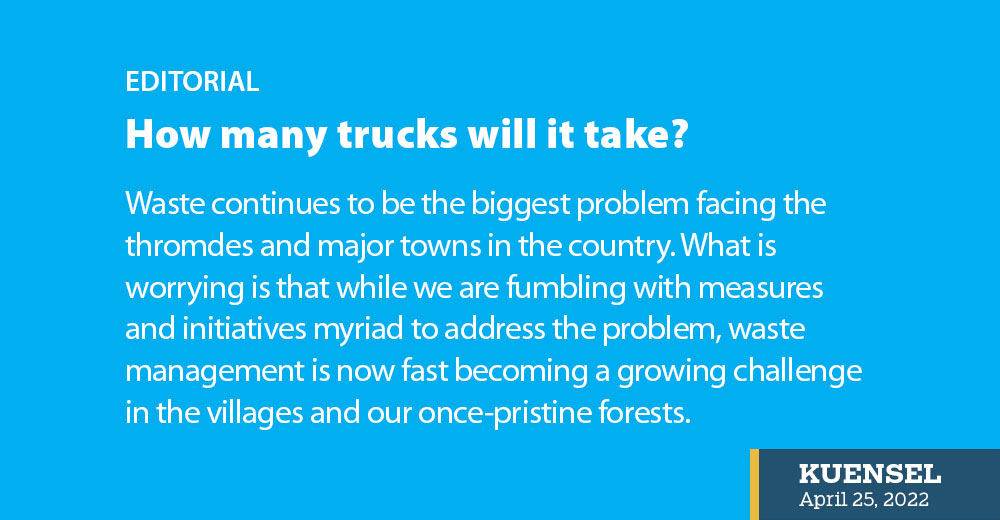Waste continues to be the biggest problem facing the thromdes and major towns in the country. What is worrying is that while we are fumbling with measures and initiatives myriad to address the problem, waste management is now fast becoming a growing challenge in the villages and our once-pristine forests.
The flagship programme to address the issue of growing waste in the urban centres must raise its game; surveys and findings should lead to concrete actions. There is a need to stress more on recycling waste because landfills should never be the ultimate option. Most of the landfills in the country are already overwhelmed by the amount of waste which threatens to engender problems that are hazardous to the environment and human lives.
The national waste inventory survey 2019 revealed that about 65 percent of households do not have access to waste collection services. Thimphu, Phuentsholing, Gelephu, and Samdrupjongkhar are expected to generate 143 tonnes of waste a day. Last year, in Thimphu, 19,717.5 metric tonnes went to the landfill in Memelakha.
Last week, the government and the people of Japan donated 28 compactor trucks, three dumper placers, two backhoe loaders, an excavator, a bulldozer, and 24 containers worth Nu 330 million for four thromdes. Thimphu Thromde got 17 compactor trucks, 24 containers, three container carriers, and a bulldozer. Phuntsholing got five compactor trucks and an excavator. Samdrupjongkhar got two container trucks and a backhoe loader. Gelephu got four container trucks and a backhoe.
In the light of the shortage of compactor and dumper trucks in the thromdes, this is expected to improve waste collection significantly; as established by a study, the waste generation to waste collection ratio must be improved. Currently, only one-fourth of households in urban areas may not have access to waste collection services, but 93 percent of those who are using the service say that inappropriate timing and location of waste collection points are the major challenges.
As Foreign Minister put it “There is a lot to be done to address the waste issues, starting from educating and creating awareness.” Japan International Cooperation Agency’s (JICA) Chief Representative, Watanabe Kozo, said that the involvement of stakeholders was critical in changing our mindset toward inclusive waste management.
Education, awareness, and investment are important; the communities will then take care of their own sense of ownership. That is the policy direction we need—change must begin in the hearts of the people. Otherwise, we will never have enough waste collection trucks to take care of waste in the country.


